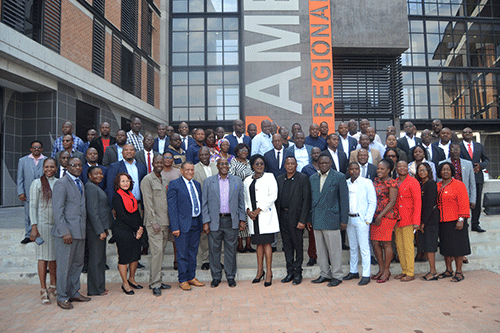KATIMA MULILO – The office of the auditor general will soon have an independent auditor to audit their financial books once the Audit Bill, which is near completion, becomes law.
Currently, the law requires that all government ministries, offices, and agencies (OMAs) should be audited by the auditor general, which includes the auditor general auditing its own financial books.
Some local authorities’ managers attending a week-long stakeholders’ engagement workshop in Katima Mulilo on Monday wanted to know who audits the books of the auditor general’s office.
The session is aimed to facilitate dialogue between the Office of the Auditor General, leadership and management of regional councils and local authorities.
In particular, Tsumeb local authority CEO, Victoria Kapenda questioned who audit the auditor general’s office books while it continues to give disclaimers to government OMAs.
“Can the auditor general next time prepare a presentation for us and tell us who is preparing their books and how they are performing over the years,” she queried.
During an interview on the sidelines of the gathering this week, deputy auditor general Goms Menette admitted that as it stands, the office of the auditor general audits its own books due to the existing law that it should audit all government OMAs.
“That’s why we audit ourselves. We are cognisant of the fact that it’s not correct that we are auditing ourselves. We should be audited by an independent entity. But what we have now is the Audit Bill. It is finalised. The next stage is to engage the minister of finance, and then engage cabinet committee of legislation,” he disclosed.
According to Menette, the Bill is mostly dealing with issues pertaining to appointing a private entity to audit the auditor general’s office and also have an oversight body that will appoint such auditors.
“There will be an oversight. We will become independent. Currently, we are in the public service but also auditing the public service. The Bill will assist us go out of that public service and be independent and then have an oversight body to take care of our operations,” he alluded.
At the moment, he said the office of the auditor general gets its budget from treasury while they audit their own finance.
Auditor general Junias Kandjeke through Zoom said the Audit Bill of the office of auditor general forms part of such laws that will promote transparency and accountability in the use of public resources.
“This legal document will ensure independence of the office,” he told the meeting participants.
The sessions are held under the theme ‘Enhancing Transparency in the Plight of Accountability”.
Hence, he added the office wants to be independent so they can get their budget from parliament.
Further, he expressed disappointment towards local authorities that do not turn up for stakeholders engagements to get help improve their financial books.
“We invited many to come. This is social responsibility that we are bringing. We are saying ‘come local authorities so we explain to you what is expected of you and you can improve’. If they are not coming, we get disappointed. The public is also disappointed. The public wants us to account. If people are failing to account, they need to be brought to book, which is the responsibility of parliament,” he expressed.
Kandjeke stressed this is an issue that is of utmost importance in today’s world, where transparency and accountability are essential for building trust and ensuring good governance.
“Transparency is all about openness and honesty in the way we conduct our affairs. It is about being accountable to the people we serve, and providing them with the information they need, to make informed decisions. Transparency is critical for building public trust, promoting good governance, and preventing corruption,” he noted.
Unfortunately, Kandjeke said transparency is often lacking in many aspects, especially in public institutions.
Therefore, he stated through audit reports conducted annually, his office ensures to provide more information on how public funds are being spent and strengthening governance structures, while ensuring the laws and regulations are complied with.
He emphasised enhancing transparency and accountability is not just the responsibility of the government but of civil society and the private sector.
“It is my view that civil society has an important role to play in promoting transparency and accountability, by holding public officials accountable and advocating for reforms. I also urge the private sector to play a role by promoting good governance practices in their own operations and supply chains,” Kandjeke recommended.
This year, the Office of the Auditor General will host the ninth stakeholders’ engagement in two sessions; one in Katima Mulilo and the other in Oshakati in August.
During the Katima Mulilo session, the office invited the leadership and management from five regions. These are Zambezi, Kavango West, Kavango East, Ohangwena, and Otjozondjupa.
– anakale@nepc.com.na


